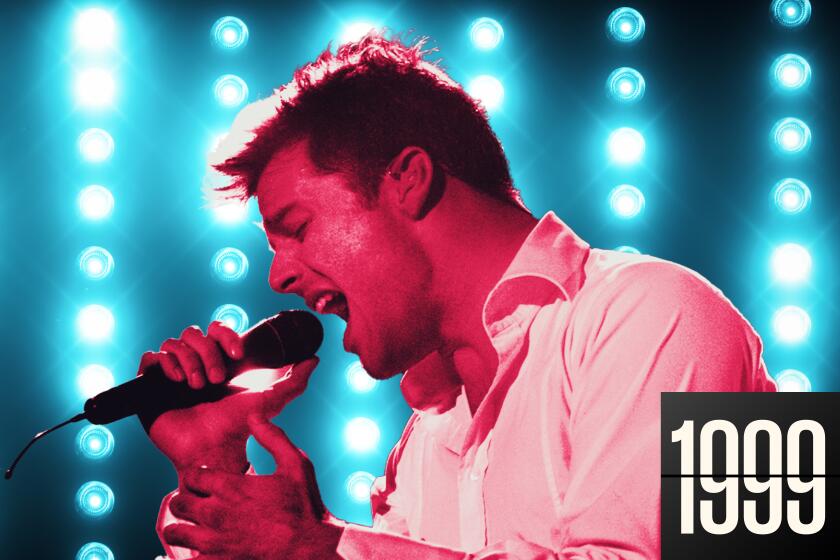Common man’s hero
Because Johnny Cash had been in and out of the hospital with such regularity in recent years, we all should have been ready for the news of his death Friday morning.
Still, it hit hard.
This voice of the American experience for a half-century seemed as indestructible as a national monument. He certainly was a national treasure who set a standard of excellence in pop music.
He sold millions of records and lived in a mansion on a lake outside Nashville, yet he never lost his sense of the common man’s struggle that was ingrained in him in the cotton fields of Arkansas, the state where he was born.
“When Johnny Cash goes, we’ll have lost the greatest ever,” fellow country music star Merle Haggard said a few weeks ago. “Most people are lucky and can have a hit that lasts a week or a month because they happen to come up with a song people identify with.
“But Cash spoke to us with such passion and truth that he would have been a star 80 years ago or 80 years from now. If anyone in this business is any good, he measures himself against Johnny Cash.”
Cash, whose deep baritone had overwhelming character and authority, arrived at Sam Phillips’ Sun Records studio in Memphis during a remarkable time in the ‘50s when the roster also included Elvis Presley, Jerry Lee Lewis, Roy Orbison and Charlie Rich.
No one did more to shape American pop music in the last half-century than Presley, who toured with Cash during their days on the label.
But pure artistry?
“Man, you gotta know it was Johnny Cash,” Phillips once said. “He wasn’t just trying to make hit records. He was trying to tell the story of the common man. And he never stopped doing it.”
Cash seemed to be born with the natural compassion and curiosity of an artist. He rewrote the rules in everything from clothing (no sequins) to tapping rock artists from Bob Dylan to Bruce Springsteen for material. He also put together concept albums about subjects that interested him, even though he knew they wouldn’t sell as well as his more mainstream fare. He sang about the railroads, Native Americans, convicts, the working man and God.
Cash wrote some classic songs himself, including “Folsom Prison Blues” and “I Walk the Line,” but he also had a great ear for other writers, and he loved nothing better than opening his house to them.
He would sit with writers, from Dylan to Haggard, for hours, and they would come because a nod from Cash meant more than a Grammy.
As a struggling songwriter in the ‘60s, Kris Kristofferson, who had learned to fly a helicopter in the Air Force, got a job as a janitor at Columbia Records hoping that he could meet Cash and try to pitch him some songs.
When that didn’t work, Kristofferson, on a drunken morning, landed a helicopter on Cash’s lawn to make sure he got the singer’s attention. He handed the startled Cash a copy of “Sunday Morning Coming Down” because he knew no one could sing it with the conviction and understanding of his hero.
It was a perfect match -- Cash’s deep voice and the tale of a lost soul looking for redemption.
On a Sunday morning sidewalk
Wishing Lord that I was stoned
‘Cause there’s something in a Sunday
That makes a body feel alone.
Despite the soulfulness of that recording, it’s unlikely “Sunday Morning Coming Down” would be a hit today. The heart of commercial pop music, from country to rock to hip-hop, has been sacrificed to shallow video images and polished production techniques.
That’s why when someone with independence and integrity comes along, like maverick rocker Jack White of the White Stripes, it’s only natural for critics to say he reminds them of a young Johnny Cash.
During an interview last fall, Cash was so weak from a series of illnesses that he had to stop talking every few minutes to catch his breath. His eyesight was also severely limited, but he hadn’t lost his desire to make music.
He even picked up a guitar and sang some gospel tunes that he wanted to record, and he found the energy to finish the songs.
Recently, he was thrilled that he was nominated for an MTV award for the video made of his recording of Trent Reznor’s “Hurt,” a rock song about feeling so devastatingly empty inside that even being able to feel pain is a comfort of sorts.
Cash planned to attend the MTV ceremony last month in New York, but illness prevented him from making the trip from Nashville. If he had walked on stage, frail but courageous, Madonna kissing Britney Spears wouldn’t have seemed like such a big deal. Cash was what everyone would have remembered.
But Cash’s journey wasn’t solitary. He was accompanied for most of his life by his wife, June Carter Cash, who died in May. Her devotion not only helped him overcome a severe drug habit in the ‘60s but also gave him the strength to carry on during his many illnesses.
In the liner notes to June’s new “Wildwood Flower” album, Rosanne Cash, Johnny’s daughter from his first marriage, said her stepmother began every day by asking, “What can I do for you, John?”
It was one of the great love stories, and there were fears when June Carter Cash died that Johnny Cash would lose his will to live. Musician friends rushed him into the studio to keep him busy.
In the end, the music wasn’t enough for Cash. He missed June too much. Now, we will miss him.
More to Read
The biggest entertainment stories
Get our big stories about Hollywood, film, television, music, arts, culture and more right in your inbox as soon as they publish.
You may occasionally receive promotional content from the Los Angeles Times.






